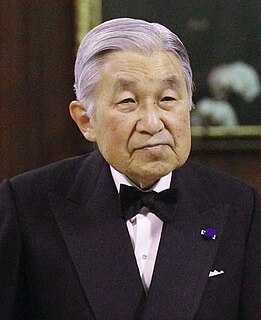 W
WAkihito is a member of the Imperial House of Japan who reigned as the 125th emperor of Japan, according to the traditional order of succession, from 7 January 1989 until 30 April 2019. He presided over the Heisei era, Heisei being an expression of achieving peace worldwide.
 W
WAlbert I reigned as King of the Belgians from 1909 to 1934. He ruled during an eventful period in the history of Belgium, which included the period of World War I (1914–1918), when 90 percent of Belgium was overrun, occupied, and ruled by the German Empire. Other crucial issues included the adoption of the Treaty of Versailles in June 1919, the ruling of the Belgian Congo as an overseas possession of the Kingdom of Belgium along with the League of Nations mandate of Ruanda-Urundi, the reconstruction of Belgium following the war, and the first five years of the Great Depression (1929–1934). King Albert died in a mountaineering accident in eastern Belgium in 1934, at the age of 58, and he was succeeded by his son Leopold III. He is popularly referred to as the "Knight King" or "Soldier King" in Belgium in reference to his role during World War I.
 W
WAlexander I, also known as Alexander the Unifier, was a prince regent of the Kingdom of Serbia from 1914 and later a king of Yugoslavia from 1921 to 1934. He was assassinated by the Bulgarian Vlado Chernozemski, during a 1934 state visit to France.
 W
WAlfonso XIII, also known as El Africano or the African, was King of Spain from 17 May 1886 to 14 April 1931, when the Spanish Second Republic was proclaimed. He was a monarch from birth as his father, Alfonso XII, had died the previous year. Alfonso's mother, Maria Christina of Austria, served as regent until he assumed full powers on his sixteenth birthday in 1902.
 W
WMohammed Abdel Rahman Abdel Raouf al-Qudwa al-Husseini, popularly known as Yasser Arafat or by his kunya Abu Ammar, was a Palestinian political leader. He was Chairman of the Palestine Liberation Organization (PLO) from 1969 to 2004 and President of the Palestinian National Authority (PNA) from 1994 to 2004. Ideologically an Arab nationalist, he was a founding member of the Fatah political party, which he led from 1959 until 2004.
 W
WHafez al-Assad was a Syrian statesman and military officer who served as President of Syria from 1971 to 2000. He was also Prime Minister of Syria from 1970 to 1971, as well as regional secretary of the regional command of the Syrian regional branch of the Arab Socialist Ba'ath Party and secretary general of the National Command of the Ba'ath Party from 1970 to 2000.
 W
WJacques René Chirac was a French politician who served as President of France from 1995 to 2007. Chirac was previously the Prime Minister of France from 1974 to 1976 and from 1986 to 1988, as well as the Mayor of Paris from 1977 to 1995.
 W
WChristian X was King of Denmark from 1912 to 1947, and the only King of Iceland between 1918 and 1944.
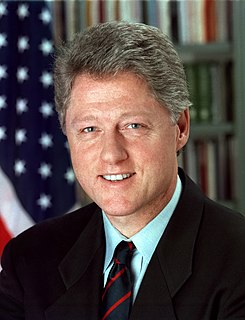 W
WWilliam Jefferson Clinton is an American politician who served as the 42nd president of the United States from 1993 to 2001. Prior to his presidency, he served as governor of Arkansas from 1979 to 1981 and 1983 to 1992 and as attorney general of Arkansas from 1977 to 1979. A member of the Democratic Party, Clinton was known as a New Democrat, and many of his policies reflected a centrist "Third Way" political philosophy. He is the husband of Hillary Clinton, who was the secretary of state from 2009 to 2013 and ran for president in 2008 and 2016.
 W
WElizabeth II has held numerous titles and honours, both during and before her time as monarch of each of her Commonwealth realms. Each is listed below; where two dates are shown, the first indicates the date of receiving the title or award, and the second indicates the date of its loss or renunciation.
 W
WFarouk I was the tenth ruler of Egypt from the Muhammad Ali dynasty and the penultimate King of Egypt and the Sudan, succeeding his father, Fuad I, in 1936.
 W
WHeinz Fischer GColIH OMRI RSerafO GCollSE is a former Austrian politician. He took office as President of Austria on 8 July 2004 and was re-elected for a second and last term on 25 April 2010, leaving office on 8 July 2016. Fischer previously served as minister of science from 1983 to 1987 and as president of the National Council of Austria from 1990 to 2002. A member of the Social Democratic Party of Austria (SPÖ), he suspended his party membership for the duration of his presidency.
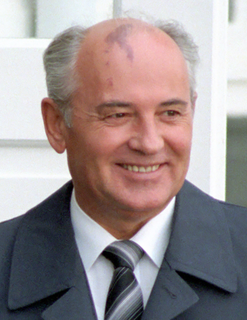 W
WMikhail Sergeyevich Gorbachev is a Russian and former Soviet politician. The eighth and last leader of the Soviet Union, he was the General Secretary of the Communist Party of the Soviet Union from 1985 until 1991. He was also the country's head of state from 1988 until 1991, serving as the chairman of the Presidium of the Supreme Soviet from 1988 to 1989, chairman of the Supreme Soviet from 1989 to 1990, and president of the Soviet Union from 1990 to 1991. Ideologically, Gorbachev initially adhered to Marxism–Leninism, although he had moved towards social democracy by the early 1990s.
 W
WGustaf V was King of Sweden from 1907 until his death in 1950. He was the eldest son of King Oscar II of Sweden and Sophia of Nassau, a half-sister of Adolphe, Grand Duke of Luxembourg. Reigning from the death of his father, Oscar II, in 1907 to his own death 42 years later, he holds the record of being the oldest monarch of Sweden and the third-longest rule, after Magnus IV and Carl XVI Gustaf. He was also the last Swedish monarch to exercise his royal prerogatives, which largely died with him, although they were formally abolished only with the remaking of the Swedish constitution in 1974. He was the first Swedish king since the High Middle Ages not to have a coronation and so never wore the king's crown, a practice that has continued ever since.
 W
WVáclav Havel was a Czech statesman, playwright, and former dissident, who served as the last President of Czechoslovakia from 1989 until the dissolution of Czechoslovakia in 1992 and then as the first President of the Czech Republic from 1993 to 2003. He was the first democratically elected president of either country after the Fall of Communism. As a writer of Czech literature, he is known for his plays, essays, and memoirs.
 W
WEmperor Shōwa , better known in English by his personal name Hirohito (裕仁), was the 124th emperor of Japan, ruling over the Empire of Japan from 1926 until 1947, after which he was Emperor of the state of Japan until his death in 1989. He was succeeded by his fifth child and eldest son, Akihito. Hirohito and his wife, Empress Kōjun, had seven children, two sons and five daughters. By 1979, Hirohito was the only monarch in the world with the title "emperor". Hirohito was the longest-lived and longest-reigning historical Japanese emperor and one of the longest-reigning monarchs in the world.
 W
WHenryk Jan Jabłoński was a Polish Socialist. After 1948, he became a Communist politician, as well as a historian and professor at Warsaw University. He served as head of state of the People's Republic of Poland between 1972 and 1985.
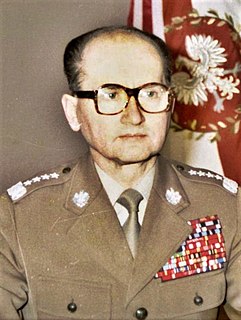 W
WWojciech Witold Jaruzelski was a Polish military officer, politician and de facto dictator of the Polish People's Republic from 1981 until 1989. He was the First Secretary of the Polish United Workers' Party between 1981 and 1989, making him the last leader of the Polish People's Republic. Jaruzelski served as Prime Minister from 1981 to 1985, the Chairman of the Council of State from 1985 to 1989 and briefly as President of Poland from 1989 to 1990, when the office of President was restored after 37 years. He was also the last commander-in-chief of the Polish People's Army, which in 1990 became the Polish Armed Forces.
 W
WLech Aleksander Kaczyński was a Polish lawyer and politician who served as the Mayor of Warsaw from 2002 until 2005, and as President of Poland from 2005 until his death in 2010. Before his tenure as president, he previously served as President of the Supreme Audit Office from 1992 to 1995 and later Minister of Justice and Public Prosecutor General in Jerzy Buzek's cabinet from 2000 until his dismissal in July 2001.
 W
WKim Il-sung was a North Korean politician and the founder of North Korea, which he ruled from the country's establishment in 1948 until his death in 1994. He held the posts of Premier from 1948 to 1972 and President from 1972 to 1994. He was also the leader of the Workers' Party of Korea (WPK) from 1949 to 1994. Coming to power after the end of Japanese rule in 1945, he authorized the invasion of South Korea in 1950, triggering an intervention in defense of South Korea by the United Nations led by the United States. Following the military stalemate in the Korean War, a ceasefire was signed on 27 July 1953. He was the third longest-serving non-royal head of state/government in the 20th century, in office for more than 45 years.
 W
WAleksander Kwaśniewski is a Polish politician and journalist. He served as the President of Poland from 1995 to 2005. He was born in Białogard, and during the communist rule, he was active in the Socialist Union of Polish Students and was the Minister for Sport in the Communist government during the 1980s. After the fall of Communism, he became a leader of the left-wing Social Democracy of the Republic of Poland, a successor to the former ruling Polish United Workers' Party, and a co-founder of the Democratic Left Alliance.
 W
WLeopold III was King of the Belgians from 1934 until 1951. On the outbreak of World War II, Leopold tried to maintain Belgian neutrality, but after the German invasion in May 1940, he surrendered his country, earning him much hostility, both at home and abroad.
 W
WMengistu Haile Mariam is a former Ethiopian soldier and politician who was the head of state of Ethiopia from 1977 to 1991 and General Secretary of the Workers' Party of Ethiopia from 1984 to 1991. He was the chairman of the Derg, the socialist military junta that governed Ethiopia, from 1977 to 1987, and the President of the People's Democratic Republic of Ethiopia (PDRE) from 1987 to 1991.
 W
WFrançois Marie Adrien Maurice Mitterrand was a French statesman who served as President of France from 1981 to 1995, the longest time in office in the history of France. As First Secretary of the Socialist Party, he was the first left-wing politician to assume the presidency under the Fifth Republic.
 W
WMohammad Reza Pahlavi, also known as Mohammad Reza Shah, was the last Shah (King) of the Imperial State of Iran from 16 September 1941 until his overthrow in the Iranian Revolution on 11 February 1979. Due to his status as the last Shah of Iran, he is often known as simply the Shah.
 W
WPrince Paul of Yugoslavia, also known as Paul Karađorđević, was prince regent of the Kingdom of Yugoslavia during the minority of King Peter II. Paul was a first cousin of Peter's father Alexander I.
 W
WPeter II was the last king of Yugoslavia, reigning from October 1934 until his deposition in November 1945. He was the last reigning member of the Karađorđević dynasty.
 W
WJohannes Rau was a German politician (SPD). He was President of Germany from 1 July 1999 until 30 June 2004 and Minister President of North Rhine-Westphalia from 20 September 1978 to 9 June 1998. In the latter role, he also served as President of the Bundesrat in 1982/83 and in 1994/1995.
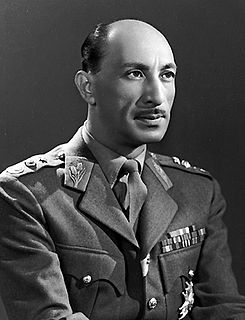 W
WMohammed Zahir Shah was the last king of Afghanistan, reigning from 8 November 1933 until he was deposed on 17 July 1973. Serving for over 39 years, Zahir was the longest-serving ruler of Afghanistan since the foundation of the Durrani Empire in the 18th century. He expanded Afghanistan's diplomatic relations with many countries, including with both sides of the Cold War. In the 1950s, Zahir Shah began modernizing the country, culminating in the creation of a new constitution and a constitutional monarchy system. Demonstrating nonpartisanship, his long reign was marked by peace in the country that was lost afterwards.
 W
WReza Shah Pahlavi was a military brigadier general, minister of war, prime minister, first Shah of the House of Pahlavi of the Imperial State of Iran. He reigned from 15 December 1925 until he was forced to abdicate by the Anglo-Soviet invasion of Iran on 16 September 1941. Reza Shah introduced many social, economic, and political reforms during his reign, ultimately laying the foundation of the modern Iranian state. Therefore, he is regarded as the founder of modern Iran.
 W
WJoseph Vissarionovich Stalin was a Georgian revolutionary and Soviet political leader who governed the Soviet Union from 1924 until his death in 1953. He served as both General Secretary of the Communist Party of the Soviet Union (1922–1952) and Chairman of the Council of Ministers of the Soviet Union (1941–1953). Despite initially governing the country as part of a collective leadership, he ultimately consolidated power to become the Soviet Union's dictator by the 1930s. A communist ideologically committed to the Leninist interpretation of Marxism, Stalin formalised these ideas as Marxism–Leninism while his own policies are known as Stalinism.
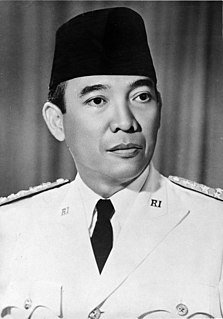 W
WSukarno was an Indonesian statesman, politician, nationalist and revolutionary who was the first president of Indonesia, serving from 1945 to 1967.
 W
WPehr Evind Svinhufvud af Qvalstad was the third President of Finland from 1931 to 1937. Serving as a lawyer, judge, and politician in the Russian Grand Duchy of Finland, he played a major role in the movement for Finnish independence. In 1917–1918, Svinhufvud was the first Head of State of independent Finland, first as Chairman of the Senate and subsequently as Protector of State or Regent. He also served as Prime Minister from 1930 to 1931.
 W
WGabriel Terra Leivas was a Uruguayan politician and lawyer who served as president of Uruguay from 1931 to 1938.
 W
WAhmed Sékou Touré was a Guinean political leader and African statesman who became the first president of Guinea, serving from 1958 until his death in 1984. Touré was among the primary Guinean nationalists involved in gaining independence of the country from France.
 W
WWalter Ernst Paul Ulbricht was a German communist politician. Ulbricht played a leading role in the creation of the Weimar-era Communist Party of Germany (KPD) and later in the early development and establishment of the German Democratic Republic in East Germany. As the First Secretary of the Socialist Unity Party from 1950 to 1971, he was the chief decision-maker in East Germany. From President Wilhelm Pieck's death in 1960 on, he was also the East German head of state until his own death in 1973. As the firm leader of the strongest and most important Communist satellite, Ulbricht had a degree of bargaining power with the Kremlin that he used effectively. For example, he demanded the building of the Berlin Wall in 1961 when the Kremlin was reluctant.
 W
WKārlis Augusts Vilhelms Ulmanis ([ˈkaːrlis ˈɑuɡusts ˈvilxɛlms ˈuɫmɑnis], was a Latvian politician. He was one of the most prominent Latvian politicians of pre-World War II Latvia during the interwar period of independence from November 1918 to June 1940. He served four times as Prime Minister, the last time as the head of an authoritarian regime, during which he subsequently also adopted the title of President of Latvia.
 W
WVictor Emmanuel III reigned as King of Italy from 29 July 1900 until his abdication on 9 May 1946. In addition, he was Emperor of Ethiopia (1936–1941) and King of the Albanians (1939–1943). During his reign of nearly 46 years, which began after the assassination of his father Umberto I, the Kingdom of Italy became involved in two world wars. His reign also encompassed the birth, rise, and fall of Italian Fascism and its regime.
 W
WEzer Weizman listen (help·info) was the seventh President of Israel, first elected in 1993 and re-elected in 1998. Before the presidency, Weizman was commander of the Israeli Air Force and Minister of Defense.
 W
WWilhelmina was Queen of the Netherlands from 1890 until her abdication in 1948. She reigned for nearly 58 years, longer than any other Dutch monarch. Her reign saw both World War I and World War II, as well as the Dutch economic crisis of 1933.
 W
WTodor Hristov Zhivkov was a Bulgarian communist statesman who served as the de facto leader of the People's Republic of Bulgaria (PRB) from 1954 until 1989 as General Secretary of the Bulgarian Communist Party. He was the second longest-serving leader in the Eastern Bloc, the longest-serving leader within the Warsaw Pact and the longest-serving non-royal ruler in Bulgarian history.